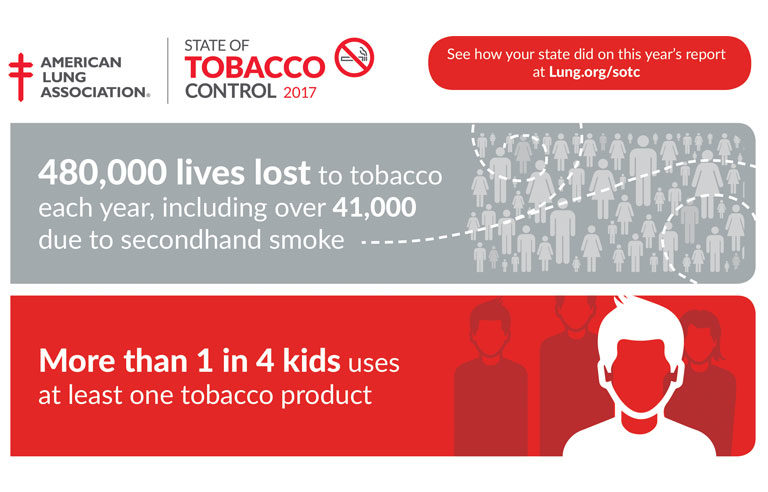Report ranks Texas, Wyoming last on smoke-free workplaces

Photo: American Lung Association
Washington – Texas and Wyoming earned the lowest possible scores from the American Lung Association when it comes to smoke-free workplaces, the association states in its annual State of Tobacco Control report for 2017.
Both states received “zero” ratings on the smoke-free air grading chart for public and private worksites. The American Lung Association uses a four-point scale in which states receive a top score if their workplaces are 100 percent smoke-free with no exemptions. Scores are lowered if smoking restrictions depend on the type of ventilation, location of smoking area and number of employees. States may earn a bonus point if laws require the grounds or a specific distance from entries and exits to be smoke-free.
Texas and Wyoming were the only states to earn minimum scores for both public and private worksites. Seven more states received low scores for private worksites: Alabama, Kentucky, Mississippi, North Carolina, South Carolina, Virginia and West Virginia.
The report also provided rankings for restaurants and bars, where some workers inhale secondhand smoke while on the job. The six states to receive zero scores at both restaurants and bars were Alabama, Kentucky, Mississippi, South Carolina, Texas and West Virginia.
Not all news was bad. Seven states received the top score of five for both public and private worksites: Hawaii, Illinois, Kansas, Maine, North Dakota, Oregon and Washington.
“Over the years, we have seen the decline of adult and youth cigarette smoking rates – thanks to the success of tobacco prevention and quit-smoking policies – which are now at historically low levels,” American Lung Association President and CEO Harold P. Wimmer said in the report’s introduction. “But despite this promising trend in cigarette use, tobacco use remains the leading cause of preventable death and disease in the United States, taking 480,000 lives every year.”
Post a comment to this article
Safety+Health welcomes comments that promote respectful dialogue. Please stay on topic. Comments that contain personal attacks, profanity or abusive language – or those aggressively promoting products or services – will be removed. We reserve the right to determine which comments violate our comment policy. (Anonymous comments are welcome; merely skip the “name” field in the comment box. An email address is required but will not be included with your comment.)

